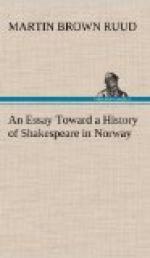In 1865, Paul Botten Hansen, best known to the English-speaking world for his relations with Bjornson and Ibsen, reviewed[11] the eleventh installment of Lembcke’s translation of Shakespeare. The article does not venture into criticism, but is almost entirely a resume of Shakespeare translation in Norway and Denmark. It is less well informed than we should expect, and contains, among several other slips, the following “...in 1855, Niels Hauge, deceased the following year as teacher in Kragero, translated Macbeth, the first faithful version of this masterpiece which Dano-Norwegian literature could boast of.” Botten Hansen mentions only one previous Danish or Norwegian version of Shakespeare—Foersom’s adaptation of Schiller’s stage version (1816). He is quite obviously ignorant of Rosenfeldt’s translation of 1790; and the Rahbek-Sanders translation of 1801 seems also to have escaped him, although Hauge expressly refers to this work in his introduction. Both of these early attempts are in prose; Foersom’s, to be sure, is in blank verse, but Foersom’s Macbeth is not Shakespeare’s. Accordingly, it is, in a sense, true that Hauge in 1855 did give the Dano-Norwegian public their first taste of an unspoiled Macbeth in the vernacular.[12]
[11. Illustreret Nyhedsblad—1865, p. 96.]
[12. Macbeth—Tragedie
i fem Akter af William Shakespeare.
Oversat og fortolket af N.
Hauge. Christiania. 1855. Johan Dahl.]
Hauge tells us that he had interested himself in English literature at the risk of being called an eccentric. Modern languages then offered no avenue to preferment, and why, forsooth, did men attend lectures and take examinations except to gain the means of earning a livelihood? He justifies his interest, however, by the seriousness and industry with which Shakespeare is studied in Germany and England. With the founts of this study he is apparently familiar, and with the influence of Shakespeare on Lessing, Goethe, and the lesser romanticists. It is interesting to note, too, that two scholars, well known in widely different fields, Monrad, the philosopher—for some years a sort of Dr. Johnson in the literary circles of Christiania—and Unger, the scholarly editor of many Old Norse texts, assisted him in his work.
The character of Hauge’s work is best seen in his notes. They consist of a careful defense of every liberty he takes with the text, explanations of grammatical constructions, and interpretations of debated matters. For example, he defends the witches on the ground that they symbolize the power of evil in the human soul.
Man kan sige at Shakespeare i dem og deres
Slaeng har givet de
nytestamentlige Daemoner Kjod og Blod.




